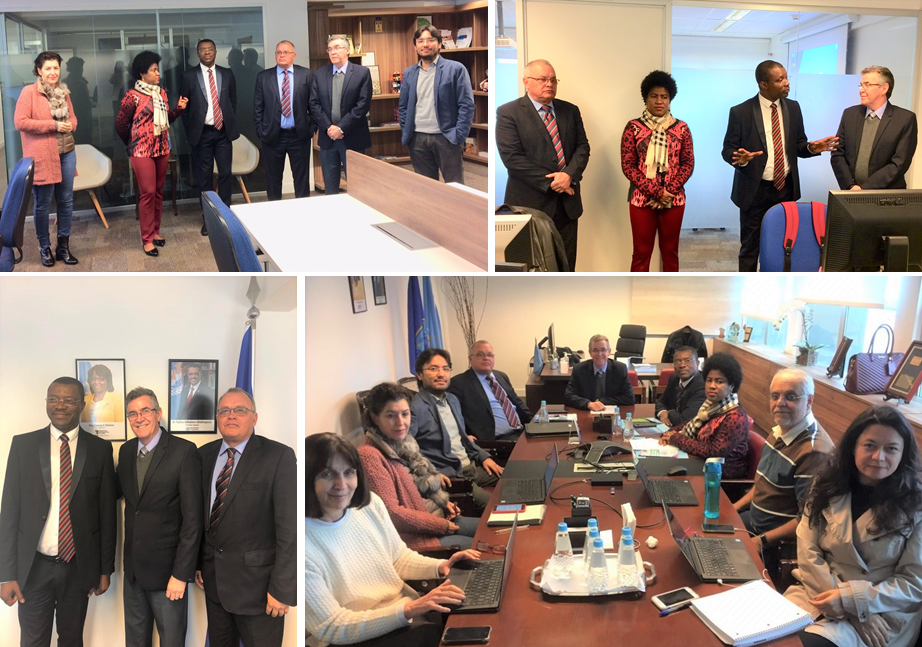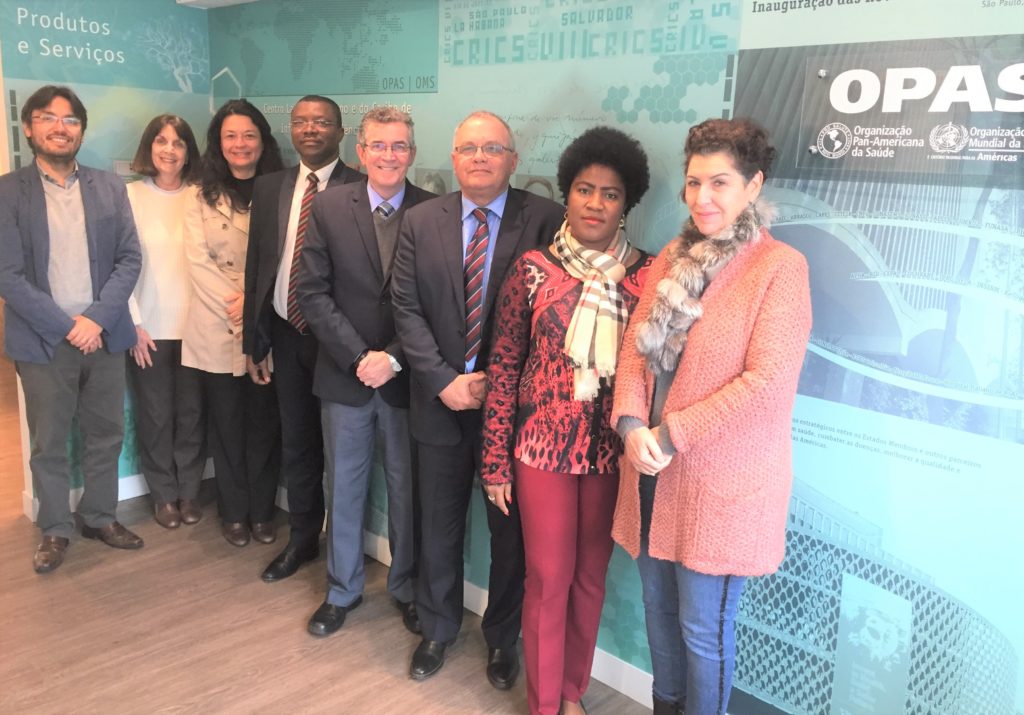On September 6, a delegation from the Medical School of Universidade Lueji A’Nkonde, from Malanje, Angola (ULAN), visited BIREME in order to identify joint actions to strengthen the School’s scientific and technical information management, as well as those of the North Luanda province and Angola.
André Pedro Neto, Dean of ULAN; Bernardino Rafael Moya Díaz, Director of the Centro Médico de Informação Toxicológica; and Helena F. Biango, Head of the Department of Administrations of the Centro Médico de Informação Toxicológica; were part of the delegation, and were received by the Director of BIREME, Dr. Diego González, and by the managers of the technical and administrative sectors of the Center, who presented the projects, products and services of the Center related to scientific health information.
Pedro Neto, founding president of the Centro de Atendimento Toxicológico (CETOX) in the country’s capital, expressed interest in strengthening scientific research at ULAN, as well as in other medical schools of Angola, as a means of improving medical students’ training and consequently the quality of health professionals, in order to improve the health conditions of the population.
 During the meeting, a historical background of BIREME’s work in Portuguese speaking countries was presented. The work was part of a project led by the World Health Organization (WHO) from 2007 to 2013 (ePORTUGUÊSe Network[1]). BIREME participated actively in this project through the VHL Network[2]. The reactivation of VHL Angola was considered, with the support of research and education institutions, libraries and documentation centers in the country, much like the Center has been doing recently with VHL Mozambique.
During the meeting, a historical background of BIREME’s work in Portuguese speaking countries was presented. The work was part of a project led by the World Health Organization (WHO) from 2007 to 2013 (ePORTUGUÊSe Network[1]). BIREME participated actively in this project through the VHL Network[2]. The reactivation of VHL Angola was considered, with the support of research and education institutions, libraries and documentation centers in the country, much like the Center has been doing recently with VHL Mozambique.
The Global Index Medicus (GIM) was also presented; its technological platform is under BIREME’s responsibility and coordinated by the WHO through its Global Libraries, with the objective of broadening the access, visibility, use and impact of local and regional health information published in low and medium income countries, as was noted by Renato Murasaki, Methodology and Information Technology Manager.
In addition to working for the reactivation of the VHL in the country, researchers, students and health professionals benefited from training on health information localization and topics of scientific communication, through online and classroom courses.
Managers of the technical and administrative areas, as well as BIREME’s coordination of scientific communication briefly presented their lines of work and in which way they could support ULAN in strengthening its capacities on health information and scientific communication, as well as on potential sources of financing for a joint project with the Center.
Dr. Pedro Neto confirmed the possibility of applying for financing in order to initiate a technical cooperation project with BIREME and coordinate the lines of action with the WHO Regional Office, AFRO.
 According to Moya Díaz, “information is power, and it is necessary to provide students and health professionals of Angola with information for decision making in health”. Dr. Pedro Neto reaffirmed the importance of the partnership with BIREME in order to work on the information component within the institution and in the rest of the country.
According to Moya Díaz, “information is power, and it is necessary to provide students and health professionals of Angola with information for decision making in health”. Dr. Pedro Neto reaffirmed the importance of the partnership with BIREME in order to work on the information component within the institution and in the rest of the country.
Dr. Diego González, Director of BIREME, said that working with Portuguese speaking countries is one of the Center’s priorities in the joint effort with the Organization’s Headquarters and the PAHO/WHO Collaborating Centers in Brazil. He also reaffirmed that the countries can count on BIREME to support them and responded affirmatively to the invitation to organize a mission in the country with the objective of building a plan of action to raise awareness and strengthen decision making based on evidence.
[1] See the context of the ePORTUGUÊSe project on VHL Mozambique: BIREME organizes a training workshop to reactivate VHL Mozambique in Maputo. BIREME Bulletin nº 7. Available at: http://boletin.bireme.org/en/2017/04/28/vhl-mozambique-bireme-organizes-a-training-workshop-to-reactivate-vhl-mozambique-in-maputo/
[2] Good Practices in South-South and Triangular Cooperation for Sustainable Development – Volume 2. Available at: https://drive.google.com/file/d/1pMjBpMwMDPPBD_EKtnp0zL9TxsQ3tmGT/. pg. 81